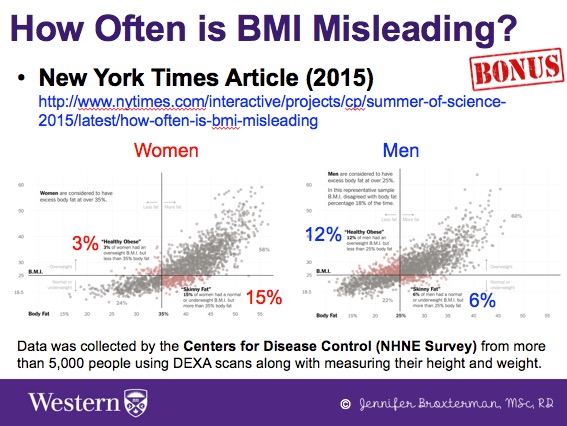

BMI – How Often is BMI Wrong?
By: Jennifer Broxterman, MSc, RD
Registered Dietitian & Sports Nutritionist
BMI: Useful, Useless, or Just Plain Confusing?
A question that often comes up is how often is BMI wrong or misleading, as in:
- How many people who are athletic and muscular get misidentified as being “overweight” or “obese” according to their BMI calculation?
or
- How many people slip under the radar as being “healthy” according to their BMI calculation, when in fact they may be carrying an unhealthy level of body fat relative to their lean muscle mass.
Well, as it turns out, an interesting study from the National Health Nutrition & Examination Survey (2005-2006) published results on this exact question. Researchers calculated BMIs for a group of 5,000 men and women (taking their weight in kilograms divided by their height in meters squared to determine BMI), and then compared that against body composition measurements collected by a DEXA scanner, which accurately measures fat mass, lean mass, and bone density, giving very precise body fat percentages to assess a person’s adiposity or overall body fatness.
As a university professor and Registered Dietitian/Sports Nutritionist, I often share the findings of this study in a Sports Nutrition class I teach, and I’ve summarized the results below (sharing a bonus powerpoint slide from one of my university lectures with all of you).

As you can see, the “incorrectness” of BMI varies between 3-15%, with slightly different errors for men and women.
IN WOMEN:
- BMI is more likely to mislabel some women as being healthy according to their BMI calculation, when in fact the DEXA scans revealed that these women were actually carrying an unhealthy level of body fat relative to their lower body weights. This error occurred in about 15% of the women tested. ==> Note: This group was called “skinny fat” by the research team, not necessarily a term I’m a fan of or agree with, but I wanted to be clear about where that terminology came from in the graph above.
- For extremely muscular women, about 3% of all tests incorrectly labelled these muscular body types as being “obese”, when in fact their DEXA scans showed a very healthy and appropriate level of body fat relative to their overall weight. Basically, these women just weighed more than what was expected based on their height, but the extra weight mostly came from muscle and lean tissue, and posed no health risk to these women.
- By deduction then, BMI correctly predicted health risk (relative to body fat percentage measured in the DEXA machines) 82% of the time in females.
IN MEN:
- BMI is more likely to make the mistake of mislabelling a man as being “obese”, when in fact DEXA scans reveal that these men actually have healthy lean body compositions and the higher than expected weight relative to their height is due to increased muscularity. However, this mislabelling only occurs about 12% of the time with males.
- Additionally, about 6% of the time BMI is also misleading in men, where they are identified as being healthy according to their BMI calculation, when in fact the DEXA scans reveal that they are carrying an unhealthy level of body fat relative to their weight.
- By deduction then, BMI correctly predicted health risk (relative to body fat percentage measured in the DEXA machines) 82% of the time in males.
So, in simple language, BMI is a helpful, inexpensive way to predict health risk and is correct in its prediction about 82% of the time (in both males and females). If you’re a really athletic, muscular individual that has a very high weight relative to your height, there’s a good chance that BMI is misleading if you’re a man (about 12% of the time), and less likely, although still plausible if you’re a woman (3% of the time). There’s also the risk of being under-identified that future health problems may creep up for women (about 15% of cases), and a little less likely, although still possible in men (about 6% of the time).
More importantly, however, your self-worth as a human being is not tied into a number! BMI can’t fully tell the story of the life you lead, your goals and priorities, and what’s important to you. It can’t fully connect the dots between your nutrition habits, exercise routine, sleep, mental health, and other self-care actions you may take to care for yourself and show love to your body.
So, please give some thought to the positive health habits that help you to feel healthy, happy, and vibrant living a life that makes YOU happy, but don’t make your entire life about chasing a number on a scale or elusive body fat % to finally feel “good enough”.
You and your body deserve so much better than that. 💕
Wishing you health & happiness,
♡ Jen
Jennifer Broxterman, MSc, RD
Registered Dietitian
NutritionRx: happy, healthy living with our team of Registered Dietitians
Prosper Nutrition Coaching: a world-class nutrition coaching certification
+
+
+
Want to work with a NutritionRx Registered Dietitian?
Learn more here: Nutrition Packages & Rates
+
+
+
Want to become a Certified Nutrition Coach?
Learn more about our habits-based Prosper Nutrition Certification



